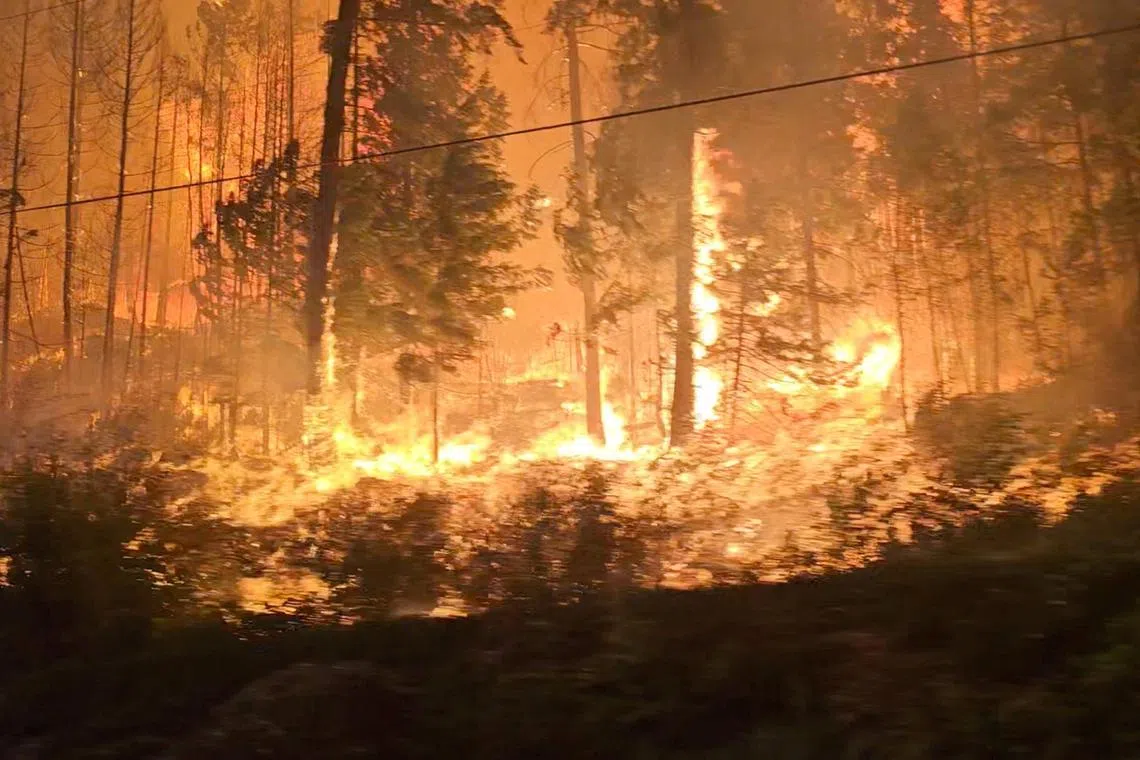Western Canada wildfires force tens of thousands to flee
Sign up now: Get ST's newsletters delivered to your inbox

A fire close to a highway near Sorrento, British Columbia, in a screengrab from a video on social media.
PHOTO: REUTERS
KELOWNA, Canada – Officials in western Canada’s British Columbia implored tens of thousands of residents to heed warnings and evacuate on Saturday as “severe and fast-changing” wildfires threatened large parts of the scenic Okanagan Valley, including the city of Kelowna.
The situation in the popular boating and hiking destination was “highly dynamic”, said Ms Bowinn Ma, the province’s minister of emergency management.
Around 30,000 people were under evacuation orders, while another 36,000 were under alert to be ready to flee, she said.
“We cannot stress strongly enough how critical it is to follow evacuation orders when they are issued,” Ms Ma said at an afternoon news conference.
“They are a matter of life and death not only for the people in those properties, but also for the first responders who will often go back to try to implore people to leave.”
The devastating fires in British Columbia and the Northwest Territories
According to estimates, 19,000 people were evacuated from Yellowknife, the Northwest Territories’ capital, over 48 hours, its environment minister Shane Thompson said late on Friday.
The city, home to some 20,000, was largely a ghost town following the largest-ever evacuation from the region.
More than 2,000km south in British Columbia, fire also bore down on Kelowna, a city of 150,000 people in the Okanagan Valley.
Blazes have already destroyed several properties in West Kelowna, separated by Okanagan Lake from its larger, eponymous neighbour.
Among them, according to local media, is the Lake Okanagan Resort, which is known for having hosted high-profile politicians such as then British Prime Minister Margaret Thatcher, who visited in 1987.
Thousands in the area were ordered evacuated or told late on Thursday to be ready to leave at a moment’s notice, while those on the University of British Columbia’s Okanagan campus were ordered on Friday to leave “immediately”.
‘Sad and depressed’
Officials described firefighters in the Kelowna area as being forced to pull back, with some becoming trapped behind lines while making “heroic efforts” to rescue area residents.
“We fought hard last night to protect our community,” local fire chief Jason Brolund told a briefing on Friday.
The blazes have caused “terrible loss”, Prime Minister Justin Trudeau told reporters after meeting evacuees from Yellowknife
Of the 19,000 who fled Yellowknife, “over 15,000 travelled out by road and 3,800 have been airlifted, with approximately 1,000 essential staff remaining in the city and surrounding area”, environmental minister Thompson posted on X, the platform formerly known as Twitter.
Those crews were remaining to erect defences from the flames, while water bombers have been seen flying low over the city, with the Canadian military also helping out.
Several towns and Indigenous communities were evacuated earlier. The flight from Yellowknife means half the population of the near-Arctic territory has been displaced.
Ms Martha Kanatsiak, who has lived in Yellowknife for 28 years, arrived late on Friday in the Alberta metropolis of Calgary.
“I’m okay, but I feel sad and depressed and worried. I never saw something like this,” the 59-year-old Inuit retiree told AFP.
Some 40 flights carrying around 3,500 passengers from Yellowknife have arrived in Calgary, said officials in the city, which has made nearly 500 hotel rooms available.
Canada is experiencing a record-setting wildfire season, with official estimates of more than 14 million ha already burned – almost twice the area of the last record of 7.3 million ha. Four people have died so far.
In addition, the fires have emitted an unprecedented amount of carbon dioxide.
Scientists say human-caused global warming is exacerbating natural hazards, making them both more frequent and more deadly. AFP


